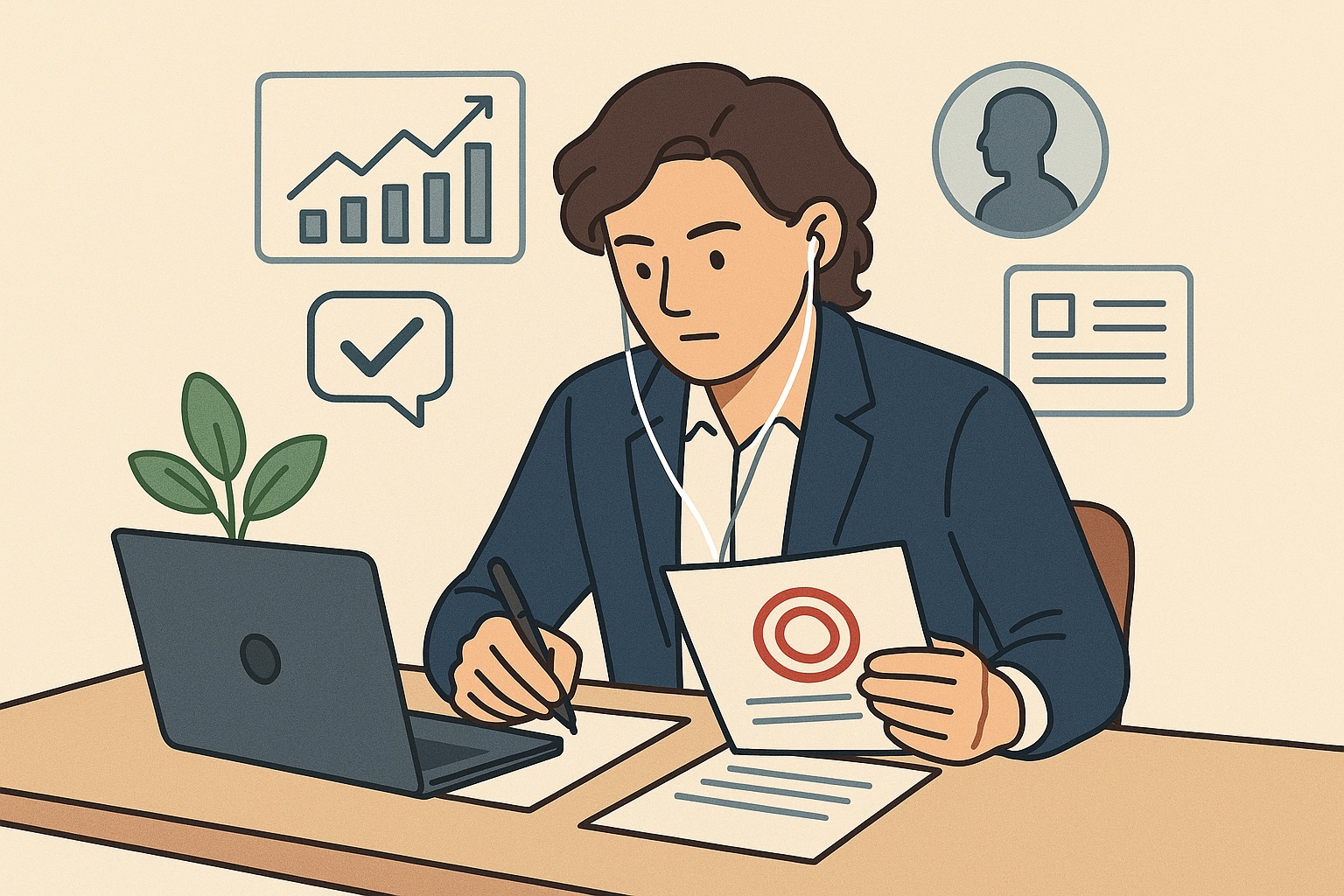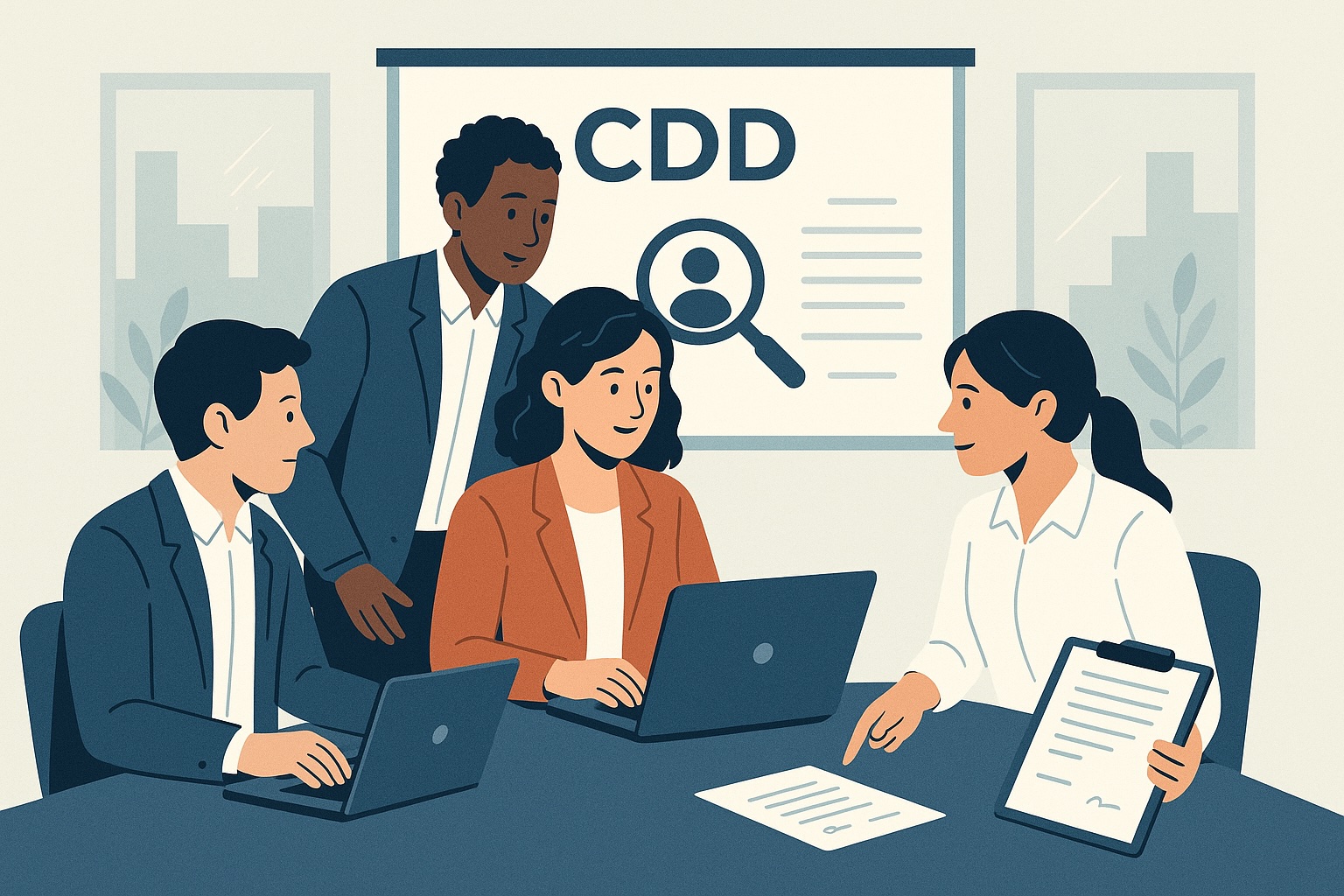What does a CDD Analyst do?
A CDD Analyst (Customer Due Diligence Analyst) specializes in assessing, monitoring, and analyzing customer profiles within financial institutions such as banks, insurance companies, and fintech firms. Their primary goal is to ensure compliance with laws and regulations regarding financial integrity, including the Dutch Anti-Money Laundering and Anti-Terrorist Financing Act (Wwft). This role is essential in the fight against financial crime.
What does a CDD Analyst do?
The daily tasks of a CDD Analyst revolve around systematically screening and assessing customers and their financial activities. The focus is on risk management, compliance, and preventing abuse of the financial system.
Tasks and responsibilities
- Conducting in-depth risk analyses on customers, transactions, and business relationships.
- Reviewing new customers (onboarding) and monitoring existing customers (periodic reviews) to ensure that customer information is up-to-date and complete.
- Identifying suspicious transactions or patterns that may indicate money laundering, fraud, or terrorist financing.
- Accurately documenting findings in structured CDD reports, which may be shared internally or with regulators.
- Maintaining contact with compliance officers, account managers, and other relevant departments to keep customer files complete and accurate.
- Staying informed about current laws and regulations, such as sanctions lists, international guidelines, and industry-specific policies.
CDD in practice: prevention and vigilance
CDD Analysts often work in specialized teams that closely collaborate with colleagues in compliance, legal, and operations. They use advanced software tools and analytical techniques to identify trends and risks. Thanks to their work, financial institutions become more resilient against abuse of their services and contribute to a more transparent and ethical economy.
Essential skills of a CDD Analyst
- Analytical ability and attention to detail.
- Knowledge of financial laws and regulations (such as Wwft, Sanctions Act, GDPR).
- Strong writing skills to produce clear and structured reports.
- Integrity and discretion when handling sensitive customer information.
- Proficiency in working with databases and CDD analysis tools.

Job Profile of a CDD Analyst
What Does a CDD Analyst Do?
A CDD Analyst (Customer Due Diligence Analyst) investigates and assesses the integrity of (potential) clients to detect and manage risks related to money laundering, fraud, and terrorist financing. Within banks, insurance companies, and other financial institutions, this role plays a key part in protecting the organization against financial and reputational risks. CDD Analysts analyze customer files, conduct risk assessments, and ensure compliance with laws and regulations such as the Wwft and sanctions legislation.
Typical Job Profile of a CDD Analyst
Organizations look for professionals who are meticulous, analytical, and legally proficient. The profile below outlines the most common requirements and expectations:
- A relevant academic education, such as finance, economics, law, criminology, or business administration.
- Practical experience in analyzing customer data and performing risk assessments in a financial or compliance-related environment.
- Thorough knowledge of laws and regulations, including the Dutch Anti-Money Laundering and Anti-Terrorist Financing Act (Wwft), sanctions legislation, and other KYC/AML guidelines.
- Excellent analytical skills and attention to detail when assessing complex customer structures, transactions, and business activities.
- Ability to clearly and convincingly communicate complex risk insights to internal and external stakeholders.
- Experience with relevant systems and tools, such as transaction monitoring software, KYC platforms, and data visualization tools.
- A proactive work attitude and a strong ethical sense when identifying unusual patterns or suspicious activities.
Competencies and Soft Skills
In addition to technical knowledge, it is important that a CDD Analyst possesses certain personal qualities:
- Independence: able to make objective analyses, even under pressure from commercial interests.
- Stress resistance: performs well under time pressure and within strict deadlines.
- Discretion: handles confidential client information with care.
- Team player: works effectively with compliance officers, legal specialists, and relationship managers.
Relevance in the Job Market
Due to growing attention to integrity risks, transparency, and regulatory oversight, the demand for qualified CDD Analysts has increased significantly. Financial institutions are actively investing in their compliance departments and are seeking professionals who contribute to a trustworthy and future-proof organization.

A Day in the Life of a CDD Analyst
A Day in the Life of a CDD Analyst
A CDD Analyst (Customer Due Diligence) primarily focuses on investigating and assessing the integrity of clients to minimize financial and reputational risks for an organization. Throughout the day, the CDD Analyst analyzes various client data, including financial transactions, business structures, and behaviors, to identify unusual or suspicious activities. Collaboration with colleagues and stakeholders is crucial to share insights and findings. In case of doubts or potential risks, the analyst takes responsibility for conducting deeper investigations and taking appropriate actions. Ongoing training and staying up to date with regulations and trends in money laundering and terrorism financing are also key aspects of the role.
08:30 – Start of the Day and System Checks
The workday begins with opening client files and checking alerts in risk management systems. Have any automated alerts been triggered? Are there transactions or client updates that require immediate attention? The analyst creates a list of priorities for the day.
09:30 – Conducting Client Investigations
Time for in-depth research. The analyst dives into complex client structures, reviews ownership relationships, and analyzes transactions. Extra caution is required with foreign clients or Politically Exposed Persons (PEPs). In some cases, information is retrieved from external sources such as the Chamber of Commerce or international sanctions lists.
11:00 – Team Meeting and Risk Assessment
During the daily team meeting, notable cases are discussed. Together with compliance officers, legal advisors, and fellow analysts, the team evaluates whether additional steps are needed, such as escalating a client file or submitting a report to the FIU (Financial Intelligence Unit).
12:00 – Lunch Break and Relaxation
Time to take a break from the screen. Most analysts take a short walk, have lunch with colleagues, or catch up on the news to stay informed about relevant developments in the financial world.
13:00 – Drafting Reports
In the afternoon, the focus shifts to documenting findings. The CDD Analyst prepares clear and well-supported risk analyses. These reports are essential for decision-making and must comply with internal and external guidelines.
14:30 – Contact with Account Managers or Clients
If certain data is missing or unclear, the CDD Analyst contacts account managers or the client directly—for example, to verify a UBO (Ultimate Beneficial Owner) or to obtain additional documentation. Clear communication and a professional tone are crucial.
15:30 – Deepening Knowledge and Training
Toward the end of the day, there is often time for deepening knowledge. This might include taking a short compliance training, reviewing new regulatory guidelines, or studying trends in money laundering and terrorism financing.
17:00 – Final Evaluation and Handover
Before wrapping up, the analyst checks the progress of ongoing cases and records a short handover in the system. Are there urgent files colleagues need to handle tomorrow? Are there approaching deadlines? After that, the system is closed, and the workday ends.

Which tools does a CDD Analyst use
KYC (Know Your Customer) Platforms
CDD analysts make extensive use of KYC platforms to verify customer identities and establish risk profiles. Modern platforms use technologies such as biometric verification, eID integration, and automated document recognition to accelerate the onboarding process and prevent identity fraud. In 2025, we are seeing a strong rise in integrated KYC solutions that combine real-time verification with continuous monitoring, which is essential in an ever-changing risk landscape.
AML (Anti-Money Laundering) Software
AML software is indispensable for detecting suspicious money flows. Tools such as NICE Actimize and Fiserv are used by CDD analysts to automatically screen complex transactions for patterns that may indicate money laundering. As of 2025, the focus is more than ever on advanced transaction monitoring, supported by AI and machine learning to detect anomalies in both traditional and digital currencies, including crypto transactions.
Sanctions List Screening Tools
Real-time screening against national and international sanctions lists is crucial. Tools like Dow Jones Risk & Compliance and Accuity help analysts to timely identify individuals, companies, and countries under sanctions. In 2025, demand for automated, continuously updated databases has significantly increased, partly due to the dynamic geopolitical climate and stricter regulations.
Customer Relationship Management (CRM) Software
CRM solutions such as Salesforce and Microsoft Dynamics enable CDD analysts to record customer information in a structured way, monitor interactions, and keep client records up to date. Through integration with KYC, AML, and sanctions tools, a powerful ecosystem emerges in which compliance processes are streamlined and risks are detected more quickly.
Data Visualization Tools
Tools like Tableau, Power BI, and Qlik provide CDD analysts with the ability to visualize large volumes of customer and transaction data. Visualizations help to uncover trends, anomalies, or hidden risks more quickly. In 2025, these tools are increasingly being enhanced with AI features such as predictive risk indicators and automated pattern recognition.
Legal and Regulatory Databases
Up-to-date access to legal and business information is essential for thorough due diligence. Platforms like LexisNexis and Bureau van Dijk offer detailed data on company structures, ownership, insolvency history, and compliance issues. In a world where regulations change rapidly, these are valuable tools for complete and timely reporting.
Data Analytics Software
For in-depth analysis, CDD analysts increasingly use programming languages like Python and R, in combination with analytics tools such as SAS. These allow them to model datasets, develop risk algorithms, and calculate risk scores. The use of AI makes it possible to predict behavioral patterns and uncover hidden links between customers and transactions.
Reporting and Documentation Tools
Preparing clear and accurate risk reports remains an important part of a CDD analyst’s job. Microsoft Word and Excel are widely used, but specialized compliance reporting tools are also gaining ground. By 2025, many processes have been automated, allowing analysts more time for interpretation and advice. Standardized reporting also supports consistency and quality assurance.

What does a CDD Analyst earn
The salary of a CDD Analyst (Customer Due Diligence) can vary significantly depending on factors such as experience, location, type of organization (such as banks, fintechs, or consultancy firms), and expertise in anti-money laundering legislation and customer integrity. CDD Analysts play a key role in identifying and managing integrity risks. Below is an overview of salary expectations based on different experience levels.
Entry Level (Junior CDD Analyst)
A Junior CDD Analyst who has just started, for example after completing a bachelor's or master's degree in law, criminology, or business administration, typically earns between €2,700 and €3,300 per month. At this level, the focus is on conducting customer investigations under the guidance of experienced colleagues. The tasks are mainly operational, involving the collection and analysis of customer data, drafting risk profiles, and identifying anomalies.
Mid-level (CDD Analyst)
A CDD Analyst with a few years of experience (approximately 2 to 5 years) earns on average between €3,300 and €4,200 per month. Responsibilities include independently handling complex cases, performing periodic reviews, and communicating with internal and external stakeholders. Analysts at this level often have experience with transaction monitoring tools and AML software and are well-versed in regulations such as the Wwft, Sanctions Act, and FATF guidelines.
Senior Level (Senior CDD Analyst)
A Senior CDD Analyst with more than 5 years of experience can expect to earn between €4,200 and €5,200 per month. These professionals handle the highest-risk and most complex customer cases, coach junior colleagues, and contribute to policy development and process optimization. They also play an active role in audits, compliance checks, and internal quality improvement projects.
CDD Team Lead / Compliance Specialist
A CDD Team Lead or Compliance Specialist fulfills a coordinating or advisory role and often earns between €5,200 and €6,500 per month. They lead CDD teams, ensure the quality of customer investigations, develop risk policies, and advise management. These roles are mainly found within larger financial institutions, trust offices, and specialized consultancy firms.
Location and Sector
Location influences salary development. Salaries in the Randstad region are generally higher than in other parts of the Netherlands. Salaries can also be higher at international banks, fintechs, or specialized consultancy firms compared to smaller, local institutions.
Education and Skills
A minimum of a bachelor’s degree is required for a CDD Analyst position, preferably in a legal, economic, or criminological field. Knowledge of legislation (such as the Wwft and Sanctions Act), analytical thinking, accuracy, and strong communication skills are essential. Experience with systems like SIRON, Actimize, or Blacksmith and certifications such as DSI or CAMS can positively influence salary levels.
| Position Level | Experience | Monthly Salary (gross) |
|---|---|---|
| Junior CDD Analyst | 0–2 years | €2,700 – €3,300 |
| CDD Analyst (mid-level) | 2–5 years | €3,300 – €4,200 |
| Senior CDD Analyst | 5+ years | €4,200 – €5,200 |
| CDD Team Lead / Compliance Specialist | Coordinating / Advisory | €5,200 – €6,500 |

Career Path and Growth Opportunities as a CDD Analyst
Career Path and Growth Opportunities as a CDD Analyst
A career as a CDD Analyst offers plenty of opportunities for growth and specialization. In the early stages, you mainly focus on standard customer due diligence and risk assessments based on established procedures. However, as you gain more experience and deepen your knowledge, various advancement possibilities within the field become available.
Advancing to Senior or Leadership Roles
After a few years of experience, you can advance to a role as a Senior CDD Analyst. In this position, you handle more complex client files, mentor junior colleagues, and play a greater role in developing internal guidelines and risk assessments.
A next step could be taking on team responsibility as a CDD Team Lead, where you coordinate activities, manage a team, and optimize workflows.
Specializing Within CDD
In addition to pursuing a leadership track, you can also specialize in particular areas within Customer Due Diligence. Examples include analyzing high-risk clients, such as Politically Exposed Persons (PEPs) or clients from countries with elevated integrity risks. You can also focus on international compliance, where knowledge of international sanction lists, money laundering networks, and cross-border structures is essential.
Transitioning into Compliance or Risk Roles
Many experienced CDD Analysts eventually move into broader compliance or risk roles, such as Compliance Officer or Risk Analyst. In these positions, you are not only involved with individual client files, but also work on policy development, audits, internal controls, and ensuring organization-wide compliance with laws and regulations.
Education and Continuous Development
To progress in your career, it is important to invest in continuous education. This includes training in anti-money laundering legislation (WWFT), sanction regulations, international regulations (such as FATF and AMLD), and skill development in data analysis or transaction monitoring. Certifications such as CAMS or a postgraduate compliance program significantly improve your chances of landing senior positions.
Conclusion: A Field Full of Growth Potential
Working as a CDD Analyst means entering a dynamic and socially relevant field. The combination of analytical work, legal knowledge, and social responsibility makes it an attractive career path with ample room for development and advancement—both in terms of expertise and responsibility.

Training and Certification for CDD Analysts
A solid education and relevant certifications are essential for being successful as a CDD Analyst. They not only demonstrate your knowledge of laws and regulations but also strengthen your position in the job market. Whether you're just starting out or looking to deepen your expertise, there are various courses and certifications that can give your career as a Customer Due Diligence specialist a significant boost.
Below is an overview of leading certifications and courses that are widely followed by CDD Analysts.
Certified Anti-Money Laundering Specialist (CAMS)
The CAMS certification is globally recognized as the standard for professionals fighting money laundering. The training covers topics such as risk assessment, customer due diligence (KYC), transaction monitoring, and reporting obligations. Many banks and financial institutions consider this certificate a requirement or a strong advantage.
Certified Financial Crime Specialist (CFCS)
The CFCS certification focuses on a broader spectrum of financial crime, such as fraud, cybercrime, corruption, sanctions, and terrorist financing. This certification is suitable for CDD Analysts who want to specialize in complex, cross-border cases and compliance challenges.
CDD for Professionals
This practice-oriented course provides a solid foundation in Customer Due Diligence. You’ll learn how to conduct customer investigations, assess risks, identify suspicious transactions, and prepare reports. Ideal for beginners as well as professionals looking to refresh their knowledge according to the latest guidelines.
Additional Courses and Modules
In addition to the certifications mentioned above, other training options are also available, such as:
- AML/KYC Foundation Courses: introductory trainings on compliance and customer integrity.
- Sanctions Legislation and UBO Investigation: in-depth insight into international sanctions regulations and identifying ultimate beneficial owners.
- Data Analysis and Reporting Tools: courses focused on using software like Excel, SQL, or Power BI within CDD processes.
Career Benefits of Certification
By obtaining relevant certifications, you demonstrate that you have up-to-date knowledge of laws and regulations and that you’re willing to invest in your professional development. Employers value this proactiveness—especially in a field where integrity and precision are key. Additionally, it increases your chances of landing interesting roles and advancement opportunities in compliance, risk management, or forensic investigation.

Whether you're just starting out or have years of experience: investing in your knowledge and skills as a CDD Analyst makes you more valuable to your organization and better prepared for the ever-changing demands of the financial sector.
Networking and Industry Associations
Networking and Professional Organizations for CDD Analysts
For CDD analysts (Customer Due Diligence), it is essential to stay active within the field. The financial world is constantly evolving, and new legislation, technologies, and risks require ongoing training and knowledge exchange. A strong professional network and membership in leading industry organizations can make a significant difference.
ACAMS and ACFCS: Internationally Recognized Networks
Two of the most important international organizations CDD professionals can join are the Association of Certified Anti-Money Laundering Specialists (ACAMS) and the Association of Certified Financial Crime Specialists (ACFCS). These industry bodies offer access to in-depth training, certifications, webinars, and practical knowledge on anti-money laundering regulations, financial investigations, and risk management. Membership is often a valuable addition to your resume and demonstrates your commitment to professional development.
Events, Workshops, and Conferences
Regularly attending events, seminars, and conferences on financial crime, compliance, and data analysis is an excellent way to stay informed about trends and best practices. These gatherings allow you to learn from experts, exchange real-world experiences, and build valuable connections that can lead to new opportunities or collaborations.
Regional Networks and Professional Groups
In addition to international organizations, there are also regional and national initiatives, such as specialized LinkedIn groups, professional associations, and peer groups for compliance and CDD professionals. Participating in these networks strengthens your connection to practical work and facilitates knowledge sharing about specific regulations or cases within the local context.
Career Growth Through Visibility and Engagement
By actively participating in professional networks, you increase your visibility within the field. This can lead to invitations for interesting projects, career opportunities, or even speaking roles at industry events. Additionally, you develop soft skills such as presenting, advising, and collaborating — essential competencies for anyone aspiring to grow into roles like Senior CDD Analyst, Compliance Officer, or Team Lead.

Impact and Social Relevance
The Societal Impact of a CDD Analyst
A CDD (Customer Due Diligence) Analyst plays a vital role in protecting both financial institutions and society from financial crime. This includes money laundering, fraud, corruption, and the financing of terrorism. By analyzing customer data, business structures, and transaction patterns, the CDD Analyst helps to detect and mitigate risks at an early stage.
Protecting the Financial System
Financial institutions act as gatekeepers of the financial system. CDD Analysts ensure that these gatekeepers take their role seriously. Through thorough customer investigations, they help exclude fraudulent clients, obscure financial flows, and unusual transactions. This prevents criminal networks from exploiting banks, insurers, or other financial entities.
Contributing to Public Safety
The societal relevance of the role goes beyond financial risks. By recognizing suspicious transactions or criminal connections in time, CDD Analysts help prevent broader societal harm. Their analyses often form the basis for reports to regulators and law enforcement, enabling effective action against subversive crime.
Strengthening Trust in the Financial Sector
Consumers, businesses, and governments must be able to rely on an honest and secure financial infrastructure. Through their work, CDD Analysts ensure transparency and accountability. They contribute to strengthening trust in banks and other institutions, which is essential for economic stability.
Enabling Sustainable and Responsible Growth
In a world where ESG (Environmental, Social & Governance) criteria are increasingly important, the CDD Analyst also plays a role in promoting responsible business practices. Through careful customer due diligence, they help prevent institutions from engaging with parties involved in environmental pollution, human rights violations, or other unethical activities. In this way, the CDD Analyst supports sustainable economic development.
Conclusion: More Than Just Compliance
The role of a CDD Analyst is no longer limited to ticking boxes. It is a meaningful and socially relevant position where data analysis, integrity awareness, and critical judgment come together. At a time when financial crime is becoming increasingly sophisticated, the contribution of CDD Analysts is more important than ever.

Case Study: The Role of a CDD Analyst
Background
FinCorp, a leading financial services provider, faced increasing pressure from regulators to strengthen its Customer Due Diligence (CDD) process. Regulations were becoming stricter and more complex, and expectations around transparency and risk management were rising rapidly. FinCorp realized that its existing customer due diligence approach no longer met modern standards.
The Challenge
FinCorp's CDD process was highly outdated: manual checks, scattered data across multiple systems, and a lack of standardization led to delays, errors, and frustration among both employees and clients. There was an urgent need for a more efficient, reliable, and future-proof solution that would comply with regulations while ensuring a smooth customer experience.
Action by the CDD Analyst
Lisa, an experienced and highly analytical CDD Analyst, was brought in to lead the project. She began by mapping out the entire customer onboarding process. Through interviews, process analyses, and risk assessments, she quickly identified the weak points.
Lisa then designed a new process that combined technology with human insight. She introduced:
- Automated screening systems for PEP and sanctions lists
- Standardized customer profiles and risk classifications
- Real-time transaction monitoring with smart alerts
- Clear work procedures and internal training for analysts
These improvements not only made regulatory compliance easier but also made the CDD teams’ work more structured and effective.
Result
The results were impressive. Within three months of implementation:
- Customer due diligence processing time was reduced by 40%
- Compliance issues dropped by 70%
- Customer satisfaction during onboarding increased noticeably
Thanks to Lisa’s approach, FinCorp now has a modern, scalable, and compliant CDD process. Her efforts not only protected the organization from risks but also prepared it for future challenges. Analysts now have more time to focus on complex cases, while routine tasks are largely automated.

Looking for a CDD Analyst?
For a small fee, you can easily post your job vacancies on our platform and reach our large, relevant network of data and analytics specialists. Applicants respond directly to you, without any intermediaries.
On DataJobs.nl, we connect supply and demand in the data and analytics job market directly—without middlemen. You won’t find any vacancies from recruitment agencies on our site. Visitors can view all vacancies for free and without an account, and apply directly.
View the options for posting vacancies here. Questions? Contact us!

Op zoek naar een uitdaging in data & analytics?
Bekijk hier alle actuele kansen! See vacancies- What does a CDD Analyst do?
- Job Profile of a CDD Analyst
- A Day in the Life of a CDD Analyst
- Which tools does a CDD Analyst use
- What does a CDD Analyst earn
- Career Path and Growth Opportunities as a CDD Analyst
- Training and Certification for CDD Analysts
- Networking and Industry Associations
- Impact and Social Relevance
- Case Study: The Role of a CDD Analyst
- Jobs for CDD Analysts
- Looking for a CDD Analyst?



